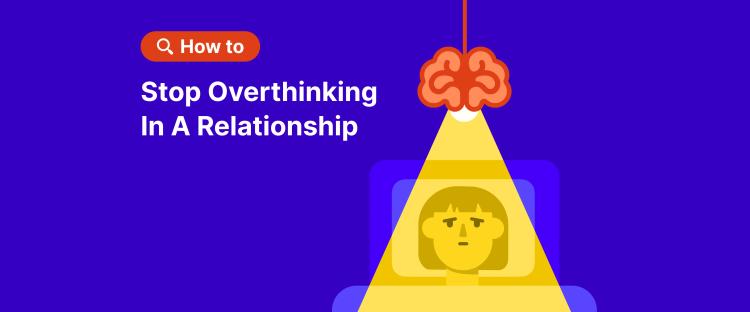Are you stuck in the trauma cycle caused by infidelity? Find out how to stop overthinking after being cheated on and manage stress with expert tips and practical strategies from bestselling relationship guides.
As 'The Body Keeps the Score' by Bessel van der Kolk illustrates, trauma lives not just in the mind but also in the body. Recognizing this mind-body connection is critical to breaking free from the cycle of intrusive thoughts and rumination.
This and other bestsellers are available in Headway's library of book summaries — your personal guide to self-discovery and personal growth. They contain essential trauma-informed techniques to move forward, rebuild self-esteem, and regain peace. Here are some of them.
Quick tips to stop overthinking after being cheated on:
Reach out for support: Connect with trusted friends, family, or support groups.
Stay mindful: Focus on your breath to stay present and calm your mind.
Journal your thoughts: Write your feelings to release overthinking and find clarity.
Practice self-care: Engage in activities you enjoy to shift your focus and bring calm.
Use affirmations: Rebuild confidence with positive affirmations and self-compassion.
Nine effective ways to calm your mind after betrayal
Stopping overthinking isn't about silencing your mind but redirecting the energy behind it. Here are effective techniques:
1. Try progressive muscle relaxation
Gently tighten and then relax different parts of your body, starting with your toes and moving up. This helps let go of physical stress that can make your mind race.

It's really important to stop the cycle of stress in your body before you try to think clearly or focus on anything else. Your mind will be much clearer if there is not as much activation in your system.
2. Practice mindfulness and breathing exercises
Mindfulness means paying attention to what’s happening right now instead of worrying about the past. In the book 'The Power of Now' by Eckhart Tolle, being present helps with overthinking.
Here’s a simple breathing exercise you can try:
Take slow, deep breaths, focusing on each inhale and exhale.
When your mind wanders, gently return your focus to your breath.
Practice self-compassion as you do this. Remind yourself that most modern humans have a monkey mind. The "monkey mind," a term from Buddhist teachings, describes the restless, chattering nature of our thoughts as they jump from one idea to another.
Your mind is often full of thoughts, which can make you feel anxious, scared, or unfocused. The first thing to do to feel calmer is to notice when your mind starts to wander.
When you catch yourself getting distracted, gently bring your attention back. Over time, it will help you stay calm and focused more easily.
3. Journal your thoughts
Writing down your feelings helps connect with and release emotional tension and gives you clarity. When you find yourself repeating the same thought loops, try to re-engage with your body, then use these prompts:
What am I feeling right now?
What do I need to feel safe?
When do I feel most valued?
How can I provide myself with a feeling of safety and validation?
What lessons can I learn from this experience?
4. Engage in activities you love
Spending time doing hobbies or trying out new activities can help you stop worrying. Whether it’s painting, taking a walk, or learning something different, these things can make your day better and happier.
Being alone sometimes and enjoying your own company can also help you feel more relaxed and think in a positive way. As David R. Hawkins says in 'Letting Go: The Pathway of Surrender,' letting go of painful thoughts makes room for better feelings to come in.

5. Use affirmations and self-compassion
Affirmations like "I am worthy of love" can help rebuild confidence. Pair them with actionable self-compassion, treating yourself like you would a close friend. In 'Rising Strong,' Brené Brown emphasizes that vulnerability and kindness to oneself are pathways to growth.
And if you know where to start — return to your body. Practice giving yourself a comforting hug and notice how it reflects in your body. Did you know your psyche can not quite distinguish between other people's hugs and your own?
6. Incorporate somatic anchoring
Physically grounding yourself helps you feel safe and present inside. Since feeling safe can be shaken when someone cheats, don’t skip this step. Try these simple exercises:
Grounding: Put your feet flat on the floor, close your eyes, and pay attention to how your body feels. Notice the support under your feet to help you stay in the present moment.
Shaking (aka Wet Dog): Stand up comfortably. Keep your eyes open and relaxed. Begin shaking off your limbs, adjusting pace and intensity. Three to five minutes will help you regulate your nervous system's excess activation (exactly what reflects as overthinking in your mind).
7. Build a support system
You don’t have to face this by yourself. It might sound like a cliché, but it’s true. In our Western culture, we often try to handle things alone. Talking about what you’re going through with close friends, family, or support groups can make you feel less alone. Here are some ideas:
Local support groups: Like DivorceCare or therapy groups
Online communities: Such as Reddit’s r/Infidelity or special Facebook groups
You might find yourself getting lost in the endless stream of information on the internet, so choose live support and use online space mainly for research purposes.
8. Leverage co-regulation
Support doesn't always have to come in words. Physical presence and shared activities with loved ones can help regulate your nervous system.
For example, walking together in nature or practicing deep breathing side by side while holding hands will allow you to foster connection and calm. When you struggle to self-regulate (which overthinking is a sign of), co-regulation is imperative.
9. Seek professional help
Therapy provides a safe space to process your emotions. A therapist can help you understand your attachment style, manage overthinking, and rebuild trust. Cognitive-behavioral therapy (CBT) is particularly effective for challenging negative thought patterns.
Yet, for many with a history of trauma and attachment wounding, it's best to work with trauma-informed practitioners. Trauma-informed therapy may include somatic practices like SE (Somatic Experiencing), IFS (Internal Family Systems), and EMDR (Eye Movement Desensitization and Reprocessing) to process stored trauma and heal the nervous system on deeper levels.
What is infidelity and how does it impact your healing process?
Infidelity happens when one partner breaks the agreed boundaries of a relationship by engaging in emotional or physical connections with someone else. It's a breach of trust that causes deep pain to another.
Wrapping your mind around what infidelity means and how to move on after it happens will hopefully help you make sense of its impact. Knowing it's not your fault is essential to healing and maintaining your self-worth. Further, you'll gain a deeper insight into the reasons behind cheating.

What drives infidelity? Understanding the reasons behind cheating
People cheat for many reasons, such as unmet emotional needs or personal insecurities. That is up for them to figure out — or for a couple's therapist, should they choose to take that path. One thing to remind yourself of, though: cheating has more to do with the cheater than with you. Remember, their actions are not a reflection of your value.
Plus, it's true that some individuals learn from their mistakes and grow, while others may repeat harmful behaviors. It's wiser to focus on actions and accountability rather than assumptions.
Why do you overthink after being cheated on?
Overthinking is your brain's way of protecting you from future pain. Replaying what happened and questioning your actions leading up to it is a natural attempt to regain a sense of control.
However, when these thoughts become constant, they can interfere with your ability to heal and move forward. Plus, with all due respect to overthinking, it's simply a stress response in your body reflected in your mind.
How does infidelity affect your mental health?
Infidelity can lead to anxiety and depression and be a traumatic experience altogether. It might trigger earlier (childhood) wounds and, therefore, have a big impact on the sense of self and self-esteem, compromising the ability to trust others or feel safe in the world. Seeking therapy and practicing self-care based on self-knowledge are quite essential for recovery.
Getting to know your attachment style, for instance, and how it manifests in relationships is a helpful first step for self-exploration.
According to 'Attached: The New Science of Adult Attachment' by Amir Levine and Rachel Heller, your attachment style may influence which coping mechanism you use. For example, anxious attachment can cause overanalyzing, while avoidant attachment may lead to shutting down emotions.
Knowing these things allows you to understand, which will generate compassion. Self-compassion is often a skill to be acquired and practiced to heal relational wounds.

The mind-body connection: How overthinking shows up physically
Yes, overthinking isn't just mental — it's also a physiological response. When betrayal occurs, the body often enters a heightened state of stress.
This fight-or-flight (sometimes freeze, too) response can cause physical symptoms like tension, rapid heartbeat, and shallow breathing, making it harder to let go of intrusive thoughts. Recognizing this connection can help you approach healing more holistically.
Bruce D. Perry and Oprah Winfrey highlight in ‘What Happened to You’ that understanding how trauma rewires the brain and nervous system is key to fostering resilience — a concept particularly relevant when coping with the aftermath of infidelity.
Betrayal hurts deeply and affects more than just your feelings. It can change how your body and mind handle stress. When someone cheats, it can leave you feeling shocked, lost, and confused, making your brain work overtime and causing you to worry a lot.
Perry and Winfrey explain that healing starts by understanding how this affects your body. After being betrayed, your brain may stay on high alert, always looking for signs that it might happen again.
While this alertness is meant to protect you, it can also make it hard to stop overthinking and to let go of upsetting thoughts. The authors explain that this state of heightened arousal can only be eased by creating a sense of safety within your body.
To foster resilience and begin to heal, it's crucial to address this mind-body connection.
Yet, we often overlook the opportunity to connect to our bodies and try to resolve it all in our heads, which is not where stress response actually happens!
Three things to remember if you choose to stay together after infidelity

Healing after cheating can be really hard and take time. It doesn’t always mean the relationship has to end. Sometimes, going to couples therapy together can help you both work through the trust problems that come up after cheating.
Individual therapy helps you grow. It helps each partner address their emotional well-being and any underlying mental health issues. Combining both therapies yields the most optimal healing for each party.
Partners must set boundaries to protect their emotional health while learning to spend time with supportive family members and friends. Individuals can pave the way for new relationships built on a solid sense of self by focusing on healthy relationships and recognizing red flags in future partners.
Practicing self-care and recognizing that heartbreak can serve as a catalyst for greater personal insight is a part of the healing process. It may help you grow more emotionally mature, resilient, and build mutual trust in future relationships.
Start your healing journey with Headway
Moving forward after facing infidelity is your chance to grow and become stronger. So, if you’re still wondering how to stop overthinking after being cheated on, start with small steps. Write down your feelings and let them go, move your body to release tension, or highlight three things you're grateful for each day.
Need expert advice? Visit Headway's online library and enjoy concise summaries of the best self-help books to empower your transformation and help you heal:
'The Power of Now' by Eckhart Tolle — A guide on how to break free from overthinking. Tolle's techniques teach you to detach from unhelpful thoughts and find peace.
'Attached' by Amir Levine and Rachel Heller — A book about attachment styles that can help you rebuild trust and set healthier boundaries. This text offers practical guidance for healing relationships.
'The Four Agreements' by Don Miguel Ruiz — The author offers simple advice to help you feel free and strong in life. One of the key ideas is "Don't take anything personally," which can help you handle tough situations better.
Whether you want to learn more about self-love, discover new ways to heal, or create lasting change, the Headway app makes it simple to start. Download the app today and take the first step toward healing and growth!
Frequently Asked Questions
Why is it so hard to stop overthinking after being cheated on?
Infidelity deeply shakes your sense of trust and safety, causing your brain to go into “protection mode.” Overthinking becomes a way to search for answers and prevent future pain, even when it leads to emotional exhaustion.
Is it normal to obsess over details after cheating?
Yes, many people fixate on what happened, when, and why. This mental looping is a trauma response, but healing begins when you start focusing less on the event and more on your own emotional recovery.
How do I rebuild trust in myself after betrayal?
Start by honoring your emotions without self-blame. Journaling, therapy, or even setting small boundaries in daily life can help you reconnect with your intuition and rebuild inner confidence.
Can overthinking delay healing after cheating?
Definitely. Constant rumination can keep you stuck in a cycle of hurt and prevent emotional closure. Learning to redirect your thoughts and process feelings constructively is essential for moving forward.
Should I confront my ex to stop overthinking?
Not always. Confrontation doesn’t guarantee clarity or peace and sometimes fuels more confusion. Closure often comes from within, not from the person who caused the pain.
What are some healthy ways to cope with betrayal anxiety?
Try grounding techniques, physical movement (like walking or yoga), daily affirmations, or talking to a therapist. These actions help calm the nervous system and gradually reduce intrusive thoughts.







